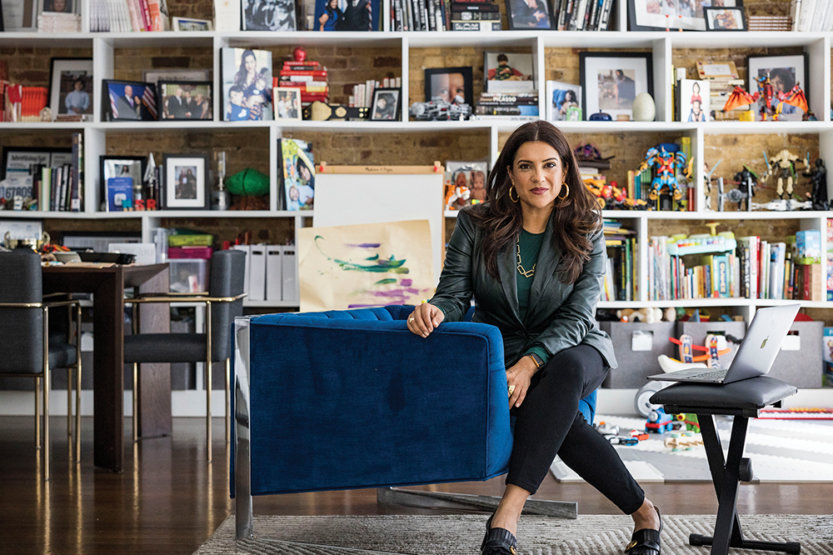Alumni Interview: Reshma M. Saujani
 Saujani’s latest venture—the Marshall Plan for Moms—germinated from an op-ed she wrote for The Hill. (Image by Katherine Marks)
Saujani’s latest venture—the Marshall Plan for Moms—germinated from an op-ed she wrote for The Hill. (Image by Katherine Marks) As a thought leader, when I’m angry or I see an injustice, I put that into words. That’s what happened early in the pandemic. I had just had my second child. I was homeschooling my kindergartner, caring for my newborn, and managing a team of other working moms as founder and CEO of the non-profit Girls Who Code.
I saw the statistics play out in real time. Two-thirds of caregiving work is done by women; 5 million-plus women left the workforce because their jobs no longer existed, they didn’t have paid leave, childcare was unaffordable and schools were shut down.
The lack of public policy response inspired me to write an op-ed for The Hill about the need for a Marshall Plan for Moms—an ambitious agenda that includes a $2,400 monthly payment to compensate moms for their labor.
In 2009, I left a lucrative law career to run for office. On the campaign trail, I noticed the gender gap in many classrooms. I didn’t win my race, but I saw the potential for technology jobs and the opportunities that those jobs offer—especially for girls of color and children of immigrants. That’s why I started Girls Who Code in 2012.
But the pandemic clarified something. We were trying to give girls the opportunity to march off into the middle class; however, the vast majority of them will become mothers. And if we don’t have structural support for them to thrive as workers and moms, we’re never going to obtain equality.
So, I kept writing. After the op-ed, we took out a full-page ad in The New York Times, a letter to President Joe Biden during his first 100 days saying, “Moms don’t work for free.” It was signed by 50 women, ranging from actors Gabrielle Union and Amy Schumer to Planned Parenthood’s CEO Alexis McGill Johnson. It was cheeky, and it went viral. Then I wrote the book Pay Up: The Future of Women and Work (And Why It’s Different Than You Think).
I started thinking, this is not just an op-ed or a book. It’s a movement.
“We need real culture change. At Girls Who Code, we made coding cool. We need to do the same for motherhood.” —Reshma M. Saujani, ’96 LAS
I’m a social entrepreneur. Back at the U of I, I didn’t know this job existed, but my experience there led me to who I am today. I was a political science and speech communications major, and an activist. I was on the Quad—organizing, leading and marching.
I learned about inequality and social structures from incredible professors and the diverse student body. I made friends from different communities, cultures and backgrounds, and that served me in the work I’m doing now.
I don’t believe anyone should run an organization for more than eight years. Girls Who Code was in a good place; I was ready to pass the baton. I found myself back where I was 10 years ago, building something from the ground up.
Already, the Marshall Plan for Moms has put mothers issues on the map. We launched a National Business Childcare Coalition, pushing companies to acknowledge that childcare is like health care, a benefit you should be providing. We’re also fighting for paid leave. If we want equality, men must do more care work, period. That begins with men taking paid leave. Studies show that if you change more diapers in year one or two, you’re doing more caregiving work by year six or seven.
The other big aspect is activating moms. We’ve been hiding this identity that is central to society. We need to reclaim it, ask for what we need.
Finally, we need real culture change. At Girls Who Code, we made coding cool. We need to do the same for motherhood.
So much of why I’ve been able to accelerate the Marshall Plan for Moms and make so much change so fast is because I had 10 years’ experience and a playbook to follow. We say to technology entrepreneurs, if you know how to build something, you can build something again. We rarely do that with non-profit leaders or social entrepreneurs, but we should.
There’s nothing more satisfying than building something that makes people’s lives better. But don’t just build one organization or solve one problem. Solve another one, and then another one.

